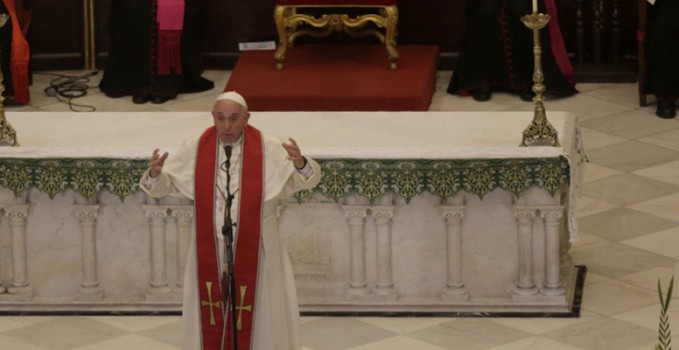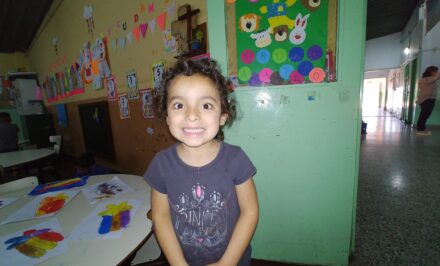FRANCIS IN CUBA – MISSIONARY OF MERCY •
On the second day of his visit to Cuba, Pope Francis improvised an address to the bishops and the religious, calling for “poverty and mercy.”
Taking up the theme of the sermon in the Mass, from disinterested service instead of service of the other and also of one’s own misery, he emphasized the service that many missionaries had carried out in the Caribbean island. He thanked them for this service, particularly toward the little ones, the neediest. “There are pastoral services which may be more gratifying, from a human point of view,” said the Pope, “without being bad or worldly. But when we seek above all to prefer serving the little one, the outcast, the sick, those who are overlooked and unloved… when we serve these little ones, we serve Jesus in the best way possible.”
He heartened all to not to be afraid, neither of reality or mercy. He emphasized: “Where there is mercy, the Spirit of Jesus is there; where there is rigor, his ministers alone are there.”
Complete text of Pope Francis’ words to religious communities
Cardinal Jaime spoke to us about poverty and Sister Yaileny (Sister Yaileny Ponce Torres, D.C.) spoke to us about the little ones: “They are all children”. I had prepared a homily to give now, based on the biblical texts, but when prophets speak — every priest is a prophet, all the baptized are prophets, every consecrated person is a prophet — then we should listen to them. So I’m going to give the homily to Cardinal Jaime so that he can get it to you and you can make it known. Later you can meditate on it. And now let’s talk a little about what these two prophets said.
Cardinal Jaime happened to say a very uncomfortable word, an extremely uncomfortable word, one which goes against the whole “cultural” structure of our world. He said “poverty”, and he repeated it several times. I think the Lord wanted us to keep hearing it, and to receive it in our hearts. The spirit of the world doesn’t know this word, doesn’t like it, hides it — not for shame, but for scorn. And if it has to sin and offend God in order to avoid poverty, then that’s what it does. The spirit of the world does not love the way of the Son of God, who emptied himself, became poor, became nothing, abased himself in order to be one of us.
Poverty frightened that generous young man who had kept all the commandments; and so when Jesus told him, “Go, sell all that you have and give it to the poor”, he was saddened. He was afraid of poverty. We are always trying to hide poverty, perhaps with good reason; but I’m talking about hiding it in our hearts. It is our duty to know how to administer our goods, for they are a gift from God. But when these goods enter your heart and begin to take over your life, that’s where you can get lost. Then you are no longer like Jesus. Then you have your security where the sad young man had his, the one who went away sad.
For you, priests, consecrated men and women, I think what Saint Ignatius said could be useful to you (and this is not just family propaganda here!). He said that poverty was the wall and the mother of consecrated life; the “mother” because it gives birth to greater confidence in God, and the “wall” because it protects us from all worldliness. How many ruined souls there are! Generous souls, like that of the sad young man: they started out well, then gradually became attached to the love of this wealthy worldliness and ended up badly. They ended up mediocre. They ended up without love because wealth impoverishes us, in a bad way. It takes away the best that we have, and strips us of the only wealth which is truly worthwhile, so that we put our security in something else.
The spirit of poverty, the spirit of detachment, the spirit of leaving everything behind in order to follow Jesus. This leaving everything is not something I am inventing. It appears frequently in the Gospel. In the calling of the first ones who left their boat, their nets, and followed him. Those who left everything to follow Jesus.
A wise old priest once told me about what happens when the spirit of wealth, of wealthy worldliness enters the heart of a consecrated man or woman, a priest or bishop, or even a Pope – anyone. He said that when we start to save up money to ensure our future — isn’t this true? — then our future is not in Jesus, but in a kind of spiritual insurance company which we manage. When, for example, a religious congregation begins to gather money and save, God is so good that he sends them a terrible bursar who brings them to bankruptcy. Such terrible bursars are some of the greatest blessings God grants his Church, because they make her free, they make her poor. Our Holy Mother the Church is poor; God wants her poor as he wanted our Holy Mother Mary to be poor.
So love poverty, like a mother. I would just suggest, should any of you want, that you ask yourself: “How is my spirit of poverty doing? How is my interior detachment?” I think this may be good for our consecrated life, our priestly life. After all, let us not forget that this is the first of the Beatitudes: “Blessed are the poor in spirit”, those who are not attached to riches, to the powers of this world.
Sister also spoke to us of the least, of the little ones, who, whatever their age, we end up treating like children because they act like children. The least, the little ones. These are words that Jesus used, words that appear in the list of things on which we will be judged: “What you did to the least of these brothers and sisters, you did to me”. There are pastoral services which may be more gratifying, from a human point of view, without being bad or worldly. But when we seek above all to prefer serving the little one, the outcast, the sick, those who are overlooked and unloved… when we serve these little ones, we serve Jesus in the best way possible.
So you were sent where you didn’t want to go, and you cried. You cried because you didn’t like it — which doesn’t mean that you are a “whimpering nun”, right? May God free us from whimpering nuns who are always complaining. This phrase isn’t mine; Saint Teresa of Avila said this to her nuns; it’s her phrase. Woe to the nun who goes about all day moaning and groaning because she suffered an injustice. In the Castilian Spanish of that age, she said: “Woe to the nun who goes about saying, ‘they treated me badly for no reason’”.
You cried because you were young, you had other dreams, perhaps you thought that in a school you could do more, that you could organize young people’s futures. And they sent you there, to the “House of Mercy”, where the tenderness and the mercy of God are most clearly shown, where the tenderness and the mercy of God become a caress. How many women and men religious “burn” – let me say it again, “burn” – their lives, caressing what is discarded, caressing those whom the world throws away, whom the world despises, whom the world wishes did not exist, those whom today’s world, with new technologies, when it looks like they may come with a degenerative illness, thinks of “sending them back” before they are born. The little ones. A young woman full of dreams begins her consecrated life by making God’s tenderness, in his mercy, alive. At times they do not understand, they have no idea, but how wonderful it is for God, and how much good it does us, for example, when a person with palsy tries to smile, or when they want to kiss you and they dribble on your face. That is the tenderness of God. That is the mercy of God. Or when they are upset and they hit you. “Burning” my life like this, with what the world would discard: that speaks to us of one person alone. It speaks to us of Jesus, who out of the sheer mercy of the Father became nothing. He “emptied himself”, says the text of Philippians, Chapter Two. He became nothing. And these people to whom you dedicate your life imitate Jesus, not because they wanted to, but because this is they way they came into the world. They are nothing, they are kept out of sight, hidden; no one comes to see them. And if it is possible, and there’s still time, they get “sent back”.
So thank you for what you do and, through you, I thank all those many women consecrated to the service of those considered “useless”, since they cannot start a business, make money or do anything “constructive” at all – these brothers and sisters of ours, these little ones, the least among us. There Jesus shines forth! And that is where my decision for Jesus shines forth. I thank you and all the consecrated men and women who do this.
“Father, I’m not a nun. I don’t take care of sick people. I’m a priest, and I have a parish, or I assist the pastor of a parish. Who is my beloved Jesus? Who is the little one? Who shows me most the mercy of the Father? Where must I find him or her?” Obviously I continue following the sequence of Matthew 25; there you have all of them: the hungry, the imprisoned, the sick – there you will meet them. But there is a special place for the priest, where the last, the least and the littlest is found — and that is in the confessional. And there, when this man or this woman shows you their misery, take care, because it is the same misery as yours, the misery from which God saved you. Is that the case? When they reveal their misery to you, please don’t give them a hard time. Don’t scold them or punish them. If you are without sin, you can throw the first stone. But only then. Otherwise, think about your own sins; think that you could be that person. Think that you could potentially fall even lower, and think that in this moment you hold in your hands a treasure, which is the Father’s mercy. Please –I’m speaking to the priests – never tire of forgiving. Be forgivers. Like Jesus, never tire of forgiving. Don’t hide behind fear or inflexibility. Just as this Sister – and all those in the same ministry as she is – do not become irate when they find a sick person who is dirty, but instead they serve him, clean him, take care of him. In the same way, when a penitent confesses, don’t get upset or worked up, don’t cast him out of the confessional, don’t give them a hard time. Jesus embraced them. Jesus loved them. Tomorrow, we celebrate the feast of Saint Matthew. He was a thief; he even, in a way, betrayed his own people. And the Gospel says that that evening Jesus went to have supper with him and others like him. Saint Ambrose has a phrase which I find very moving: “Where there is mercy, the Spirit of Jesus is there; where there is rigor, his ministers alone are there”.
Brother priest, brother bishop, do not be afraid of mercy. Let it flow through your hands and through your forgiving embrace, for the man or woman before you is one of the little ones. They are Jesus. This is what I thought I should say after hearing these two prophets. May the Lord give us these graces that these two have sown in our hearts: poverty and mercy. Because that is where Jesus is.














